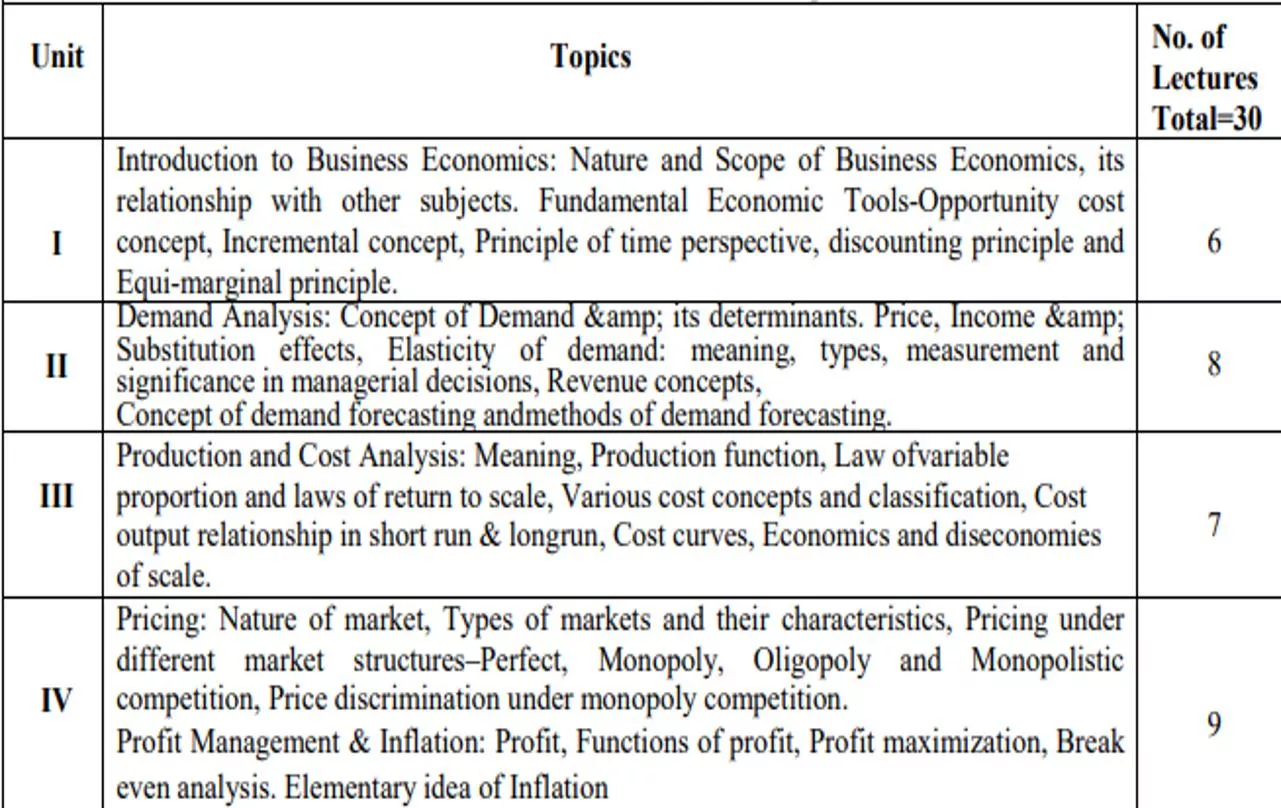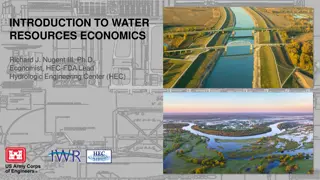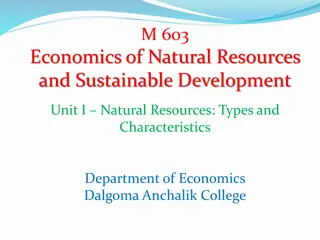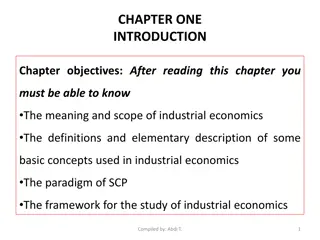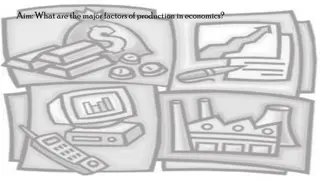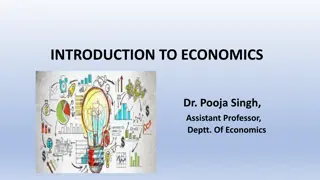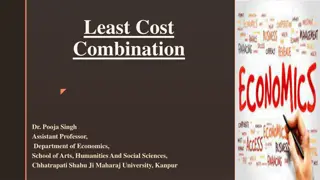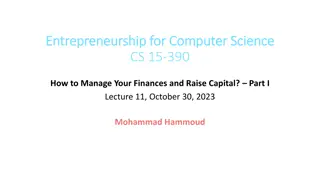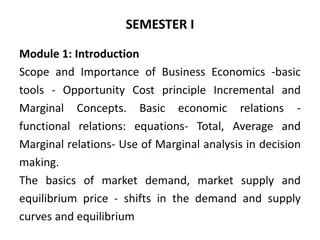Understanding Business Economics: Course Overview and Resources
Explore the course on Business Economics covering topics like demand analysis, production, pricing, and profit management. Delve into the field with suggested readings and definitions of business and economics. Gain insights into managerial decision-making in the realm of scarce resources and societal problem-solving.
Download Presentation

Please find below an Image/Link to download the presentation.
The content on the website is provided AS IS for your information and personal use only. It may not be sold, licensed, or shared on other websites without obtaining consent from the author. Download presentation by click this link. If you encounter any issues during the download, it is possible that the publisher has removed the file from their server.
E N D
Presentation Transcript
Course Title: Business Economics Course Title: Business Economics Course Code: F010101T By: Dr Pravin Kumar Agrawal Assistant Professor School of Business Management CSJM University Kanpur
Course Outcomes Course Outcomes The aim of the course is to build knowledge and understanding business economics among the student. The course knowledge about the subject matter by instilling them basic ideas about business economics. The outcome of the course will be as follows To provide knowledge about business economics. To provide knowledge about Demand Analysis. To Determine Production and cost analysis. To Make aware with pricing and profit management. seeks to give detailed
Suggested Readings Suggested Readings 1. Varsney & Maheshwari, Managerial Economics 2. Mote Paul & Gupta, Managerial Economics: Concepts & cases 3. D.N.Dwivedi, Managerial Economics 4. D.C.Huge, Managerial Economics 5. 5. Peterson & Lewis, Managerial Economics
Definition Definition Business is defined as the organization being engaged in commercial, industrial, or professional activities. Economics is the subject of Social Science, which deals with the studying of production, distribution, and consumption of goods and services.
Definition Definition Economics is concerned with the best possible use of limited resources. Robbins
Definition Definition The term economics comes from the Greek word oikos (house) and nomos (custom or law). Economics is often defined as a body of knowledge or study that discusses how a society tries to solve the human problems of unlimited wants and scarce resources. It is the scientific study of the choices made by individuals and societies with regard to the alternative uses of scarce resources employed to satisfy wants. Adam Smith (1723 1790), hailed as the Father of Economics.
Introduction to Business Economics Introduction to Business Economics Managerial or Business Economics is the branch that deals with the organization and allocation of a firm s scarce resources to achieve its desired goals. It is a link between the theory of Economics and the decision sciences in the analysis of managerial decision-making.
Introduction to Business Economics Introduction to Business Economics Business Economics is a part of Applied Economics which is concerned with the application of economic concepts and analytical tools to the process of decision-making for a business enterprise.
Economics: Science or Art Economics: Science or Art A subject is considered science if: It is based on systematic study of knowledge or facts; It is a study of the relationship between cause and effect. It is capable of measurable and based on facts. It should have the ability to forecast. All the laws are universally accepted All the laws are tested and based on experiments; It has a scale of measurement. After being analyzed, economics has all the features of science.
Economics As Science Economics As Science On the basis of all these characteristics, Prof. Robbins, Prof Jordon, Prof. Robertson etc. claimed economics as one of the subject of science like physics, chemistry etc. According to all these economists, economics has also several characteristics similar to other science subjects.
Economics As Science Economics As Science (i) Economics is also a systematic study of knowledge and facts. All the theories and facts related with both micro and macro economics are systematically collected, classified and analyzed. (ii) Economics deals with the correlation-ship between cause and effect. For example, supply is a positive function of price, i.e., change in price is cause but change in supply is effect. (iii) All the laws in economics are also universally accepted, like, law of demand, law of supply, law of diminishing marginal utility etc. (iv) Theories and laws of economics are based on experiments, like, mixed economy to is an experimental outcome between capitalist and socialist economies.
Economics As Science Economics As Science (v) Economics has a scale of measurement. According to Prof. Marshall, money is used as the measuring rod in economics.
Economics As Art Economics As Art According to . . Mehta, Knowledge is science, action is art. According to Pigou, Marshall etc., economics is also considered as an art. In other way, art is the practical application of knowledge for achieving particular goals. Science gives us principles of any discipline however, art turns all these principles into reality. Therefore, considering the activities in economics, it can claimed as an art also, because it gives guidance to the solutions of all the economic problems.
Economics is an Art Economics is an Art Art tells us how to do the thing i.e. to achieve an objective. Economics is also used for achieving a variety of goals. For e.g. All policies etc made in economics has the ultimate objective of solving economic problems. Art is the practical application of theoretical knowledge Like Art, Economics also practices its theoretical laws. For e.g. The various policies are made only after having theoretical knowledge of the society and country as a whole. Hence, economics is also an art.
Economics As Art Economics As Art Therefore, from all the above discussions we can conclude that economics is neither a science nor an art only. However, it is a golden combination of both. Hence, economics is considered as both a science as well as an art.
Economics is an Art Economics is an Art We should better consider economics as a social science, since it deals with the society as a whole and human behaviour in particular, and studies the production, distribution and consumption of goods and services.
Characteristics of Business Economics Characteristics of Business Economics The unit of studying Business Economics is the firm. So, Business Economics deals with the operation of a consumer, a corporation which involves the determination of a price of a product, revenue, costs, profit levels etc. Professors H.C. Peterson and W.C. Lewis suggested that Business Economics must be considered as a part of applied microeconomics.
Characteristics of Business Economics Characteristics of Business Economics 1. Micro Economics: Micro Economics is the study of the behaviour and problem of individual economic unit (firm). 2. Macro Economics: Macro Economics is analysis & understand the general business(firm) must operate environment in which the business operate. Study the environment of many firms. 3. Economics of firm: Managerial Economics use that body of economics, concepts & principles which is known as the Theory of firm or Economics of the firm. 4. Managerial Economics is Normative: It deals, with future planning, policies making, decision making & how to make full use of economic principles.
Scope of Business Economics Scope of Business Economics Demand analyses & Demand forecasting: It is the most important scope of Managerial Economics because all future activities and decision depends on it, law of demand, demand curve, elasticity of demand determination of demand, types of demand and demand forecasting are include in demand analyses & demand forecasting. Cost analyses: The knowledge of different cost element is necessary for every successful businessman. This part of subject includes the concept of cost, cost curves, cost analyses under the cost analyses. We analysis the cause of change in cost.
Scope of Business Economics Scope of Business Economics Output analyses: Output analysis also an important part of Managerial Economics for the efficient organization of the production process, output analyses is necessary for prefer profit planning output analyses always measured in physical unit. Price Policies: Influence the demand conditions & earning of a firm, price policies are necessary for every firm.
Scope of Business Economics Scope of Business Economics Profit Management: To earn the profit is the first object of each firm. Profit is the measurement of success of each firm under it profit are forecasting after taking into consideration the various effecting factor. All the efforts are make for maximum profit of the firm. Capital Management: Capital is the Life power of the business. We can t think about any business without capital. Capital Management of firm is a complex topic. Stable success of the firm depends on a good capital Management. Macro Economics: The activity of a firm are also affected by external forces, such as trade cycle, national income, industrial policy, tax policy.
Microeconomics and Macroeconomics Microeconomics and Macroeconomics Microeconomics ( micro meaning small) looks at the smaller picture of the economy and is the study of the behaviour of small economic units, such as that of an individual consumer, a seller (or a producer, or a firm), or a product. It focuses on the basic theories of supply and demand in individual markets (say of cars, food items, mobile phones, etc.), and deals with how individual businesses decide how much of something to produce and at what price to sell it, and how individual consumers decide on how much of something to buy. In other words, microeconomics analyses the market behaviour of individual consumers and firms, in an attempt to understand their decision-making processes.
Microeconomics and Macroeconomics Microeconomics and Macroeconomics Microeconomics deals at the firm s level and takes into consideration the decision-making power of individual units, whereas macroeconomics deals with the economy level and takes into consideration the impact of government policies on the aggregates like national income and employment.
Microeconomics and Macroeconomics Microeconomics and Macroeconomics Macroeconomics ( macro meaning large) is that branch of economic analysis that deals with the study of aggregates. As opposed to microeconomics, in macro analysis we study the industry as a unit, and not the firm. In macroeconomics, we talk about aggregate demand and aggregate supply, national income, national capital formation, employment, inflation etc.
Microeconomics and Macroeconomics Microeconomics and Macroeconomics However, micro and macro economics are not to be taken as substitutes of each other; rather they complement each other. To quote Paul Samuelson if you read one branch of economics carefully, but ignore the other, you will be half-educated .
Opportunity Cost Opportunity Cost Opportunity cost is the benefit forgone from the next best alternative that is not selected. Individuals or firms give up an opportunity(s) to use or enjoy something in order to select something else.
Opportunity cost: Example Opportunity cost: Example A firm may even have to make a choice between quantity and quality. It may commit itself to quality (and hence, remain restricted to a small customer base) by selling its product at high price (such a pricing is often regarded as market skimming pricing), or it may compromise on quality and lower the price in order to capture a larger market (such a pricing is often regarded as market penetration pricing). Let us see the opportunities foregone in each case. If the firm decides to go for the first option, it would be targeting the classes .
Opportunity cost: Example Opportunity cost: Example This way the firm has to sacrifice the opportunity of getting control over a large segment of market; this becomes its opportunity cost of selling its product at a high price. On the other hand, if it opts for keeping the price low at the cost of quality, the firm would be targeting the masses , thus, sacrificing its image of delivering high quality product. This loss in image would be the opportunity cost of selling its product at a low price, against gaining of a larger customer base. Such situations may often put firms in an ethical dilemma.
Incremental Concept Incremental Concept The concept of marginality deals with a unit increase in cost or revenue or utility. Marginal Cost (or Revenue or Utility) is the change in Total Cost (or Total Revenue or Total Utility) due to a unit change in output. In other words, Marginal Cost (or Marginal Revenue or Marginal Utility) is the Total Cost (or Total Revenue or Total Utility) of the last (or nth.) unit (of output). Thus, we may express Marginal Cost (MC) as: MCn = TCn TCn 1
Principle of time perspective Principle of time perspective The principle of time perspective may be stated as under: A decision should take into account both the short-run and long-run effects on revenues and costs and maintain the right balance between the long-run and short-run perspectives.
Discounting Principle The core of discounting principle is that a rupee in hand today is worth more than a rupee received tomorrow. In other words, it refers to time value of money, i.e., the fact that the value of money depreciates with time. One rationale of discounting is uncertainty about tomorrow, i.e., future. Even if there is no uncertainty, it is necessary to discount future rupee to make it equivalent to current day rupee.
Discounting Principle Discounting is: PVF = Present Value Factor n = period (year, etc.) and r = rate of discount PVF = 1/(1+r)n
Equi Equi- -Marginal Principle Marginal Principle This principle is also known the principle of maximum satisfaction - by allocating available resource to get optimum benefit . This principle provides a basis for maximum utilization of all the inputs of a firm so as to maximize the profitability.
Equi Equi- -Marginal Principle Marginal Principle The equi-marginal principle is based on the law of diminishing marginal utility. The equi-marginal principle states that a consumer will be maximizing his total utility when he allocates his fixed money income in such a way that the utility derived from the last unit of money spent on each good is equal. According to Marshall, "if a person has a thing which he can put to several uses, he will distribute it among these uses in such a way that it has the same marginal utility in all"
Importance of Managerial Economics Importance of Managerial Economics 1. Predicting Economics quantities: A manager has to take most of his decisions in the environment. Economics analyses makes prediction about economic event possible by analyzing various economic data such as cost, profit, demand, capital, price and output. 2. Estimating Economics relationship: Economics analyses the estimate of relationship between economic variables of income elasticity, price elasticity cost elasticity.
Importance of Managerial Economics Importance of Managerial Economics 3. Basic of business policies: Economics analysis on the basis of business policy manager takes all the decision for the firm and formulate plans for profit, capital, cost and price. 4. To assist in planning: Business Economics helps in decision making maximizing the profit of the firm. 5. To assist in Organization: It is the function of organization managerial economics helps in this work efficiently of whole firms or department can be checked out by the calculation of rate of return. The efficiency of department can be improved after checking the efficiency.
Importance of Managerial Economics Importance of Managerial Economics 6. To assist in controlling: For the purpose of controlling, business activities, business unit & their actual performance are compare with there pre-determine goal. 7. Forecasting: Forecasting is necessary for the success of the firm. 8. To assist in understanding the effect of External Force: The external force at the time of policies formulating of the firm, such as business cycle, industrial policies, licensing etc. 9. Co-ordination between principle and practice: Many schemes seems the best but these schemes cannot be applied in practical form in the firm. Conditions of firm has always changed so it must co-ordination between principle and practice
Managerial Economics in Relation with other Disciplines / Managerial Economics in Relation with other Disciplines / Branches of Knowledge Branches of Knowledge Managerial economics has a close linkage with other disciplines and fields of study. The subject has gained by the interaction with Economics, Mathematics and Statistics and has drawn upon Management theory and Accounting concepts. Managerial economics integrates concepts and methods from these disciplines and brings them to bear on managerial problems
Managerial Economics and Operations Research Managerial Economics and Operations Research Mathematicians, statisticians, engineers and others join together and developed models and analytical tools which have grown into a specialised subject known as operation research. The basic purpose of the approach is to develop a scientific model of the system which may be utilised for policy making. The development of techniques and concepts such as Linear Programming, Input-output Analysis, Inventory Theory, Decision Theory.
MANAGERIAL ECONOMICS AND MATHEMATICS MANAGERIAL ECONOMICS AND MATHEMATICS The major problem of a business man is how to a minimum cost or how to maximum profit. Mathematics concept & techniques are widely used in finding out answer to these question Its main contribution to managerial economics Geometry, algebra and calculus Logarithms determinants, input-output tables etc., and exponential, vectors and
Managerial Economics and Statistics Managerial Economics and Statistics It provides the basis for the empirical testing of theory. It provides the individual firm with measures of appropriate functional relationship involved in decision making. Statistics supplies many tools to managerial economics. Suppose forecasting has to be done. For this purpose, trend projections are used. Similarly, multiple regression technique is used. In managerial economics, measures of central tendency like the mean, median, mode, and measures of dispersion, correlation, regression, least square, estimators are widely used.
Managerial Economics and Statistics Managerial Economics and Statistics Statistical tools are widely used in the solution of managerial problems. For eg. sampling is very useful in data collection. Managerial economics makes use of correlation and multiple regression in business problems involving some kind of cause and effect relationship.
Managerial Economics and Accounting Managerial Economics and Accounting Managerial economics is closely related to accounting. It is recording the financial operation of a business firm. A business is started with the main aim of earning profit. Capital is invested / employed for purchasing properties such as building, furniture, etc and for meeting the current expenses of the business. Goods are bought and sold for cash as well as credit. Cash is paid to credit sellers. It is received from credit buyers. Expenses are met and incomes derived. This goes on the daily routine work of the business. The buying of goods, sale of goods, payment of cash, receipt of cash and similar dealings are called business transactions.
Managerial Economics and Theory of Decision Making Managerial Economics and Theory of Decision Making The theory of decision making is relatively a new subject that has a significance for managerial economics. In the process of management such as planning, organising, leading and controlling, decision making is always essential. Decision making is an integral part of today s business management. A manager faces a number of problems connected with his/her business such as production, inventory, cost, marketing, pricing, investment and personnel. Economist are interested in the efficient use of scarce resources hence they are naturally interested in business decision problems and they apply economics in management of business problems. Hence managerial economics is economics applied in decision making.




